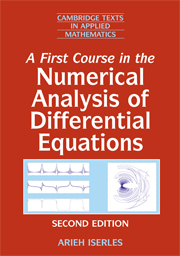Book contents
- Frontmatter
- Contents
- Preface to the second edition
- Preface to the first edition
- Flowchart of contents
- I Ordinary differential equations
- II The Poisson equation
- III Partial differential equations of evolution
- 16 The diffusion equation
- 17 Hyperbolic equations
- Appendix Bluffer's guide to useful mathematics
- Index
16 - The diffusion equation
Published online by Cambridge University Press: 05 June 2012
- Frontmatter
- Contents
- Preface to the second edition
- Preface to the first edition
- Flowchart of contents
- I Ordinary differential equations
- II The Poisson equation
- III Partial differential equations of evolution
- 16 The diffusion equation
- 17 Hyperbolic equations
- Appendix Bluffer's guide to useful mathematics
- Index
Summary
A simple numerical method
It is often useful to classify partial differential equations into two kinds: steady-state equations, where all the variables are spatial, and evolutionary equations, which combine differentiation with respect to space and to time. We have already seen some examples of steady-state equations, namely the Poisson equation and the biharmonic equation. Typically, equations of this type describe physical phenomena whose behaviour depends on the minimization of some quantity, e.g. potential energy, and they are ubiquitous in mechanics and elasticity theory. Evolutionary equations, however, model systems that undergo change as a function of time and they are important inter alia in the description of wave phenomena, thermodynamics, diffusive processes and population dynamics.
It is usual in the theory of PDEs to distinguish between elliptic, parabolic and hyperbolic equations. We do not wish to pursue here this formalism – or even provide the requisite definitions – except to remark that elliptic equations are of the steady-state type whilst both parabolic and hyperbolic PDEs are evolutionary. A brief explanation of this distinction rests in the different kind of characteristic curves admitted by the three types of equations.
Evolutionary differential equations are, in a sense, reminiscent of ODEs. Indeed, one can view ODEs as evolutionary equations without space variables. We will see in what follows that there are many similarities between the numerical treatment of ODEs and of evolutionary PDEs and that, in fact, one of the most effective means to compute the latter is by approximate conversion to an ODE system.
- Type
- Chapter
- Information
- Publisher: Cambridge University PressPrint publication year: 2008



